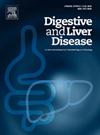有肝移植计划或没有肝移植计划的中心对肝胆恶性肿瘤的管理现状:多学会全国调查。
IF 4
3区 医学
Q1 GASTROENTEROLOGY & HEPATOLOGY
引用次数: 0
摘要
背景:目的:为了调查没有肝移植项目的肝胆中心(HB中心)和有肝移植项目的肝胆中心(LT中心)之间的实践情况,我们以各中心主任为对象,开展了一项包含38个项目的全国性网络调查:调查包括 4 个临床小故事,收集了有关 HCC 和移植肿瘤学方法的数据:结果:去除重复数据后,共有 75 名受访者。来自LT中心的受访者(n = 22,29.3%)更倾向于LT治疗米兰标准以外的HCC(90.9% vs. 67.9%,p = 0.037)、复发性HCC(95.5% vs. 50.9%,p = 0.002)以及胆管癌或神经内分泌肿瘤等其他恶性肿瘤。对于无法切除的结直肠肝转移瘤,接受LT治疗的中心比例无明显差异(100% vs. 88.7%,p = 0.100):这项全国性调查显示,肝转移癌和肝癌晚期治疗中心对肝转移癌的管理以及对移植肿瘤学的认识可能存在差异。HB 和 LT 中心之间建立有效的网络联系对于提供最佳治疗和获得 LT 至关重要。本文章由计算机程序翻译,如有差异,请以英文原文为准。
Current management of hepatobiliary malignancies between centers with or without a liver transplant program: A multi-society national survey
Background
Availability of liver transplantation (LT) as a treatment for hepatocellular carcinoma (HCC) and other liver malignancies may determine heterogeneity of therapeutic strategies across different centers.
Aims
To investigate the practice between hepato-biliary centers without (HB centers) and with a LT program (LT centers), we launched a 38-item web-based national survey, with directors of centers as a target.
Methods
The survey, including 4 clinical vignettes, collected data on their approach to HCC and transplant oncology.
Results
After duplicates removal, 75 respondents were considered. Respondents from LT centers (n = 22, 29.3 %) were more in favor of LT in the case of HCC outside Milan criteria (90.9 % vs. 67.9 %, p = 0.037), recurrent HCC (95.5 % vs. 50.9 %, p = 0.002) and other malignancies such as cholangiocarcinoma or neuroendocrine tumors. No significant difference was observed concerning the proportion of centers favorable to LT for unresectable colorectal liver metastases (100 % vs. 88.7 %, p = 0.100).
Conclusion
This national survey showed how management of HCC and awareness of transplant oncology may differ between HB and LT centers. Effective networking between HB and LT centers is crucial to provide optimal treatment and access to LT.
求助全文
通过发布文献求助,成功后即可免费获取论文全文。
去求助
来源期刊

Digestive and Liver Disease
医学-胃肠肝病学
CiteScore
6.10
自引率
2.20%
发文量
632
审稿时长
19 days
期刊介绍:
Digestive and Liver Disease is an international journal of Gastroenterology and Hepatology. It is the official journal of Italian Association for the Study of the Liver (AISF); Italian Association for the Study of the Pancreas (AISP); Italian Association for Digestive Endoscopy (SIED); Italian Association for Hospital Gastroenterologists and Digestive Endoscopists (AIGO); Italian Society of Gastroenterology (SIGE); Italian Society of Pediatric Gastroenterology and Hepatology (SIGENP) and Italian Group for the Study of Inflammatory Bowel Disease (IG-IBD).
Digestive and Liver Disease publishes papers on basic and clinical research in the field of gastroenterology and hepatology.
Contributions consist of:
Original Papers
Correspondence to the Editor
Editorials, Reviews and Special Articles
Progress Reports
Image of the Month
Congress Proceedings
Symposia and Mini-symposia.
 求助内容:
求助内容: 应助结果提醒方式:
应助结果提醒方式:


